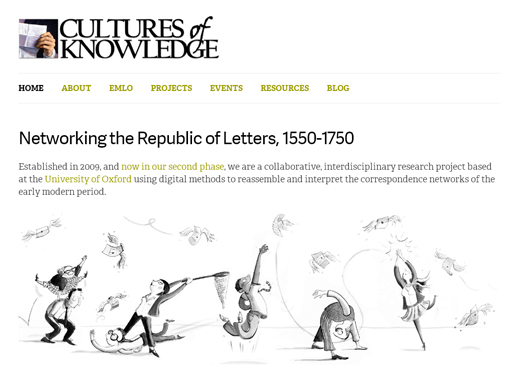 You’ve found our old website, which represents an archive of our activities during the first phase of Cultures of Knowledge, which ran between 2009 and 2012. To find out what we’re up to between now and the end of 2014, and to stay up to date with all things CofK, please visit our shiny new site. See you on the other side!
You’ve found our old website, which represents an archive of our activities during the first phase of Cultures of Knowledge, which ran between 2009 and 2012. To find out what we’re up to between now and the end of 2014, and to stay up to date with all things CofK, please visit our shiny new site. See you on the other side!
You are viewing the Cultures of Knowledge Blog archive for the ‘Project Updates’ Category:
Cultures of Knowledge Has Moved!
Presenting EMLO at Digital Transformations Moot
Tags: AHRC, Databases, Digitization, Union Catalogue, Visualization
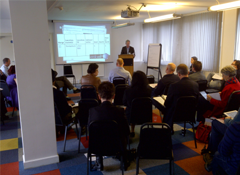
Howard mid-‘yack’
An outing to London last Monday when we presented Early Modern Letters Online at the Digital Transformations Moot, curated and funded by the AHRC. The day long event brought together digital humanists with thinkers and practitioners from other disciplines and sectors ‘to explore the possibilities of the Digital Transformations theme for new and exciting ways of working: to hack, to make, to break’.
The Moot did a great job of showcasing the very wide range of work (and attendant debates) currently being done at the intersection of the humanities and the technical, and in particular in highlighting and fostering new kinds of connections between digital technologies, arts and the humanities, and the creative and cultural industries (the latter being much more strongly represented than is usual at DH gatherings). It was also really interesting from the perspective of event design. Decked out in bracing, challenging terminology – debates were ‘moots’; delegates were ‘mootlings’; papers became ‘yacks’ – the day spread keynote lectures, panel discussions, software demos, and PechaKucha-style talks across multiple tracks and spaces in a kind of freeform digital smörgåsbord that rewarded curiosity and encouraged the creation of individual narratives and serendipitous connections between the sampled components. Further details on the Moot webpage, while the Twitter hashtag was #digitrans; videos of the various live streams will be posted the the webpage shortly.
A ‘Hasty Blotted Scribble’: New Boyle Original Discovered
Tags: Archives, Book History, Electronic Enlightenment, History of Medicine, History of Scholarship, History of Science, John Wallis, John Wilkins, London, Oxford, Ralph Bathurst, Respiration, Robert Boyle, Trinity College
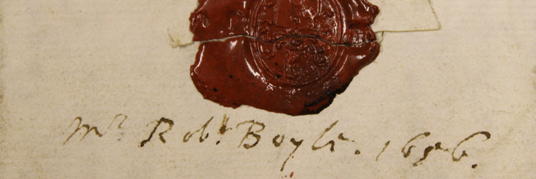
While ferreting around in the archives of Trinity College, Oxford finalizing annotations for Volume IV of The Correspondence of John Wallis, I came across a letter from Robert Boyle, the eminent natural philosopher, to the theologian and physician Ralph Bathurst, whose papers I was exploring. This manuscript was previously missing; while the letter is included in the monumental 2001 edition of Boyle’s complete correspondence (and can be consulted in Electronic Enlightenment), the editors had to base their text on a version of the letter in a 1761 print edition of Bathurst’s papers, rather than on this autograph original. Here’s the letter:
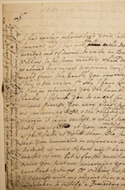 |
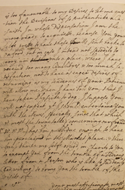 |
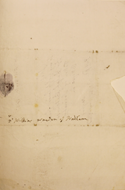 |
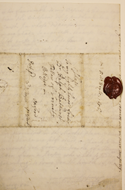 |
Trinity College Oxford Archive, Fellows 2/1/1: A new Boyle original. Images reproduced courtesy of Trinity College.
The missive – described by Boyle as a ‘hasty blotted scribble’ – is an intriguing one, shedding fascinating light on a failed publishing project. It was sent in April 1656, one of those Oxford months when lots of things were happening (even Henry Oldenburg was in town, inter alia, to sample the rich scientific culture developing in and around the university). Unfortunately for Oldenburg, two giants of the local philosophical scene were absent when he arrived. His friend Robert Boyle, who had moved to Oxford around the beginning of the year (and would stay on and off until 1668) had gone to London. Likewise in the metropolis was John Wilkins, the warden of Wadham College, who had gathered around him an illustrious circle of like-minded practitioners, including Seth Ward, Thomas Willis, and Wallis.
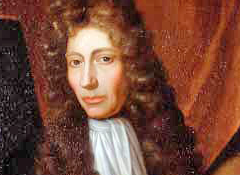
Sender Robert Boyle
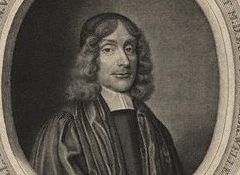
Recipient Ralph Bathurst
One of Boyle’s main tasks while in London was evidently to see through the press a promising book by Ralph Bathurst, one of the members of this glittering cadre of experimentalists. A fellow of Trinity College, who would go on to be College president and later vice-chancellor of the University, Bathurst had written three lectures on respiration as part of his examination as doctor medicinae in 1654; during the following two years, these texts were circulated scribally among the Wilkins circle, which evidently suggested revisions and emendations. Bathurst added numerous marginal notes to the manuscript of the Praescriptiones tres de respiratione and – notoriously reluctant to publish his work – was probably encouraged to do so by his celebrated friends. Boyle headed to the capital with the manuscript to spearhead the enterprise.
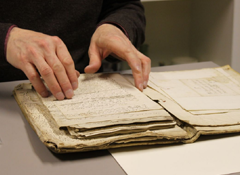
Bathurst’s letter book
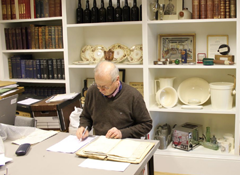
Objects and Letter-Objects
In the absence of Boyle and Wilkins (the two men who had promoted the venture most strongly), however, Bathurst began to get cold feet. Probably around the end of March, in a letter that is now lost he wrote to Boyle in London to inform him of his change of heart and to request that the manuscript be returned. Boyle did not receive the letter immediately, for he had been invited by Wilkins to inspect some peculiar natural phenomena elsewhere. Writing back to Bathurst in the April letter, Boyle expressed his disappointment at the ‘unwelcome orders you send me, concerning your excellent Lectures’, which presumably placed him in an awkward position. Indeed, Wilkins was evidently hoping to get plans back on track, and instructed Boyle not to follow Bathurst’s wish ‘to have those Jewells sent backe to Oxford’.
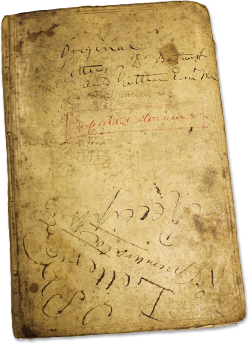 The efforts of Wilkins and Boyle to save the book were to no avail; Bathurst’s Praescriptiones tres de respiratione first saw light of day when it was published posthumously – alongside this letter – in Warton’s The Life and Literary Remains of Ralph Bathurst (London, 1761). The collapse of the project to publish Bathurst’s Praescriptiones illustrates the close relations between knowledge-makers in Oxford and London at this time. The incident even came to the attention of Samuel Hartlib, who recorded in his Ephemerides ‘Mr Boyle knows one that hath an excellent Ms. De Respiratione which hee will not publish’.
The efforts of Wilkins and Boyle to save the book were to no avail; Bathurst’s Praescriptiones tres de respiratione first saw light of day when it was published posthumously – alongside this letter – in Warton’s The Life and Literary Remains of Ralph Bathurst (London, 1761). The collapse of the project to publish Bathurst’s Praescriptiones illustrates the close relations between knowledge-makers in Oxford and London at this time. The incident even came to the attention of Samuel Hartlib, who recorded in his Ephemerides ‘Mr Boyle knows one that hath an excellent Ms. De Respiratione which hee will not publish’.
We are extremely grateful to Professor Michael Hunter for confirming the originality of this manuscript and for additional help and advice on its background.
Letters in Focus: Things That Go Bump in the Night
Tags: Archives, Bodleian Resources, England, Ghosts, History of Scholarship, Letters in Focus, Libraries, News, Religion, Seventeenth Century, Union Catalogue, Witchcraft
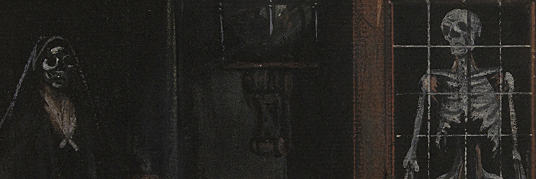
So, the evenings draw in, All Hallows’ Eve is upon us, and I find myself creeping through autumnal mists to the Bodleian’s Special Collections in search of ghosts.
There are many fleeting glimpses of hauntings in EMLO. In 1675, William Fulman asked Anthony Wood to confirm ‘the story of a ghostly funeral procession at night to St Peter le Bailey which terrified some of the Masters who were walking with the Proctor, but two which followed the procession to the Church door found the doors to open of their own accord, and then all to vanish and are since dead’. In 1706, Anne Griggs reported ‘the ghostly interview at Souldern Vicarage between the Vicar Mr Shaw and the apparition of his friend Mr Naylor on July 28… The apparition foretells the death of Mr Shaw…’ (sadly, Mr Naylor was a well-informed ghost; the Clergy of the Church of England Database [Person ID: 20286] reveals that one Geoffrey Shaw, rector of Soulderne, Oxfordshire, died on 17 November 1706, less than four months after this ghoulish encounter).
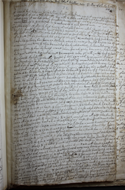 |
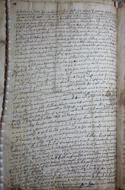 |
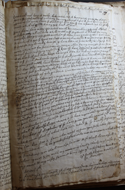 |
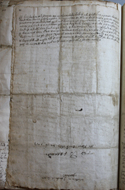 |
Bodleian Library, MS Ballard 1, fols 72–73: A seventeenth-century poltergeist. Images reproduced courtesy of the Bodleian Libraries.
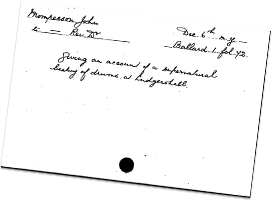 One record above all others tempts me out into the damp October fog: on a handwritten index card from the Bodleian card catalogue that gives no year, and describes a John Mompesson writing to a Reverend Doctor (now known to be William Creed, Oxford’s Regius Professor of Divinity) on 6 December (now known to be 1662), are the words ‘supernatural beating of drums’. Calling up the letter, I encounter a spine-chilling tale of a seventeenth-century household terrorized by a poltergeist. Mompesson describes how, following his apprehension of a fraudulent drummer in Ludgershall (Wiltshire) and the confiscation of the latter’s instrument, his family home in nearby Tedworth (now Tidworth) was assailed by nocturnal thumps and noises so extreme that ‘the windows would shake and the beds’. His children were special targets; apart from a brief interlude of three weeks after his wife gave birth, their beds were beaten, and the family had to endure the tune ‘Roundheads and Cuckolds goe digge, goe digge’ (more on this popular early modern ditty here). Whatever ‘it’ was ran ‘under the bed-teeke’ and scratched as if it had ‘iron talons’, tossing the young ones in bed; it left sulphurous smells, it hurled shoes over the heads of adults, pulled the infants by their nightgowns and hair, and even threw a bedstaff at the rector of Tedworth, John Cragge (CCED Person ID: 21834, yet another cleric who died relatively soon after his brush with the supernatural). See the letter images above for the whole terrifying story.
One record above all others tempts me out into the damp October fog: on a handwritten index card from the Bodleian card catalogue that gives no year, and describes a John Mompesson writing to a Reverend Doctor (now known to be William Creed, Oxford’s Regius Professor of Divinity) on 6 December (now known to be 1662), are the words ‘supernatural beating of drums’. Calling up the letter, I encounter a spine-chilling tale of a seventeenth-century household terrorized by a poltergeist. Mompesson describes how, following his apprehension of a fraudulent drummer in Ludgershall (Wiltshire) and the confiscation of the latter’s instrument, his family home in nearby Tedworth (now Tidworth) was assailed by nocturnal thumps and noises so extreme that ‘the windows would shake and the beds’. His children were special targets; apart from a brief interlude of three weeks after his wife gave birth, their beds were beaten, and the family had to endure the tune ‘Roundheads and Cuckolds goe digge, goe digge’ (more on this popular early modern ditty here). Whatever ‘it’ was ran ‘under the bed-teeke’ and scratched as if it had ‘iron talons’, tossing the young ones in bed; it left sulphurous smells, it hurled shoes over the heads of adults, pulled the infants by their nightgowns and hair, and even threw a bedstaff at the rector of Tedworth, John Cragge (CCED Person ID: 21834, yet another cleric who died relatively soon after his brush with the supernatural). See the letter images above for the whole terrifying story.
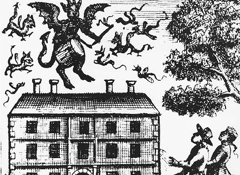
A demonic representation of the Tedworth drummer from Glanvill’s 1681 treatise
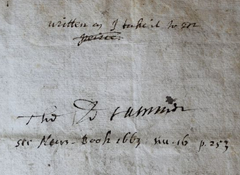
Endorsements on the letter, including a cross-reference to a 1663 news book
The Drummer of Tedworth, it turns out, is a celebrated case within the historiography of witchcraft and the early modern occult; it was given a central place in Joseph Glanvill’s 1681 attack on scepticism, the Saducismus Triumphatus, its notoriety continued to grow in the eighteenth and nineteenth centuries, and it has even been subject to minor Disneyfication. The incident, its manuscript witnesses, and its complex appropriation and memorialisation by and within different intellectual traditions is analysed in detail in a 2005 article (pdf) by Michael Hunter, which includes a full transcription of this same 6 December letter collated from three known extant versions: a copy in Corpus Christi, Oxford; a now untraceable copy formerly in a private collection in Dorset; and a copy in the hand of Anthony Wood. The document thrown up by our cryptic Bodleian card record is almost certainly not Mompesson’s original letter – there is no seal, and the lines extending to the page edges on both sides of the folio are indicative of copying – but rather adds a fourth scribal copy into the mix, one that, judging by the endorsements in two separate hands, enjoyed a complex afterlife before becoming part of the Ballard collection, most likely via the papers of Arthur Charlett (on the scribal publication and circulation of newsworthy missives in early modern England see chapter seven of James Daybell’s recent monograph on the material letter and his podcast in our 2011 seminar series). Even if this account is second-hand, close the curtains, pull up a chair, and get reading; there’s nothing like a percussive poltergeist to add drama and intrigue to Halloween…
Letters in Focus with Miranda Lewis
Miranda is editing metadata from the Bodleian card catalogue of correspondence for our union catalogue, Early Modern Letters Online. On a regular basis, she brings us hand-picked and contextualised records.
Journal Special Issue: Natural History, Medicine, and New Science
Tags: Animals, Charles Perrault, Comte de Buffon, Francis Willughby, Frogs, History of Medicine, History of Science, Insects, John Ray, Martin Lister, Natural History, Toads
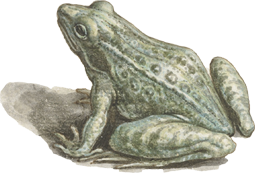 Our pertinacious (we’re running out of adjectives) Martin Lister Research Fellow – and recent inductee of the Linnean Society – Anna Marie Roos has guest-edited a special issue of the prestigious journal Notes and Records of the Royal Society.
Our pertinacious (we’re running out of adjectives) Martin Lister Research Fellow – and recent inductee of the Linnean Society – Anna Marie Roos has guest-edited a special issue of the prestigious journal Notes and Records of the Royal Society.
The special issue publishes the proceedings of the day conference History Comes to Life: Seventeenth-Century Natural History, Medicine, and the New Science, organized by Anna Marie at The Royal Society in April (with the financial and logistical support of the project, The Royal Society, the Wellcome Trust, the John Fell Fund, and the BSHS). It features six fresh and fascinating articles from leading authorities on a wide range of topics at the intersection of seventeenth-century natural history, medicine, and science, including Buffon and animals, Francis Willughby and insects, and Jan Swammerdam’s abiding intellectual infatuation with frogs and toads. You can now enjoy early access to the articles online; the print version of the special issue will be available at the end of November. You can also listen to the podcasts from the conference. Congratulations to Anna Marie and the rest of the contributors!
Epistolary Cultures in the Early Modern World
Tags: Book History, Global, History of Scholarship, History of Science, Libraries, Networks, News, Seventeenth Century, Union Catalogue
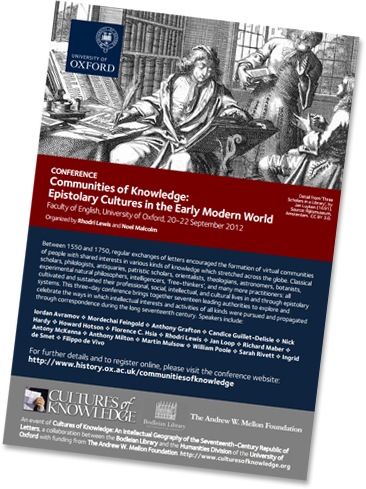 Further to exciting events in 2010 and 2011, the Project’s third international conference, Communities of Knowledge: Epistolary Cultures in the Early Modern World, recently took place in the Faculty of English on 20–22 September 2012.
Further to exciting events in 2010 and 2011, the Project’s third international conference, Communities of Knowledge: Epistolary Cultures in the Early Modern World, recently took place in the Faculty of English on 20–22 September 2012.
The event, organized by Rhodri Lewis and Noel Malcolm and attended by a record audience of over 100 delegates, assembled an all-star cast of eighteen international authorities on early modern letters, who over a three-day programme explored and celebrated the ways in which intellectual interests and activities of all kinds were pursued and propagated through correspondence during the long seventeenth century.
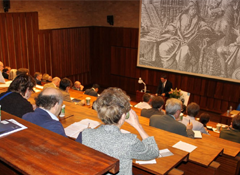
Rhodri welcomes delegates and introduces the conference themes
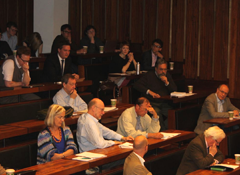
Our largest ever audience packs the lecture theatre
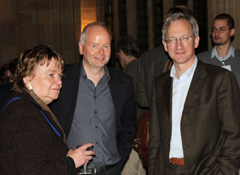
Constance Blackwell, Philip Beeley, and Howard Hotson
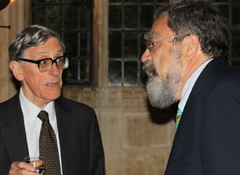
Sir Keith Thomas and Anthony Grafton at the Scaliger Reception
Particular attention was paid to the epistolary experiences of groups and networks rather than those of particular individuals – and the role of letters in constituting these communities of practice – and to the ways in which exchanges of letters coexisted with, supplemented, or competed with other kinds of knowledge production during the period. Delegates were also treated to a demonstration of our union catalogue of correspondence, Early Modern Letters Online (video now on our infrastructure page); no fewer than two publisher-sponsored drinks receptions toasting exciting new publications and partnerships (details here); and an array of quiches, sandwiches, and cakes of unusual deliciousness crafted by Trevor and Cristina from the Organic Deli Café.
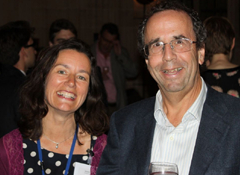
Miranda Lewis and Mordechai Feingold at the Scaliger Reception
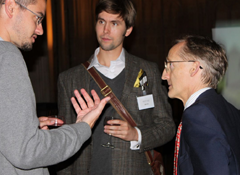
Leigh Penman, Alexander Farquhar, and Noel Malcolm

A conference marches on its stomach: artisan quiches

Sandwiches on home-made bread also exceeded scholarly expectations

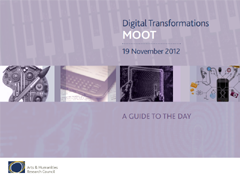

 Join
Join 